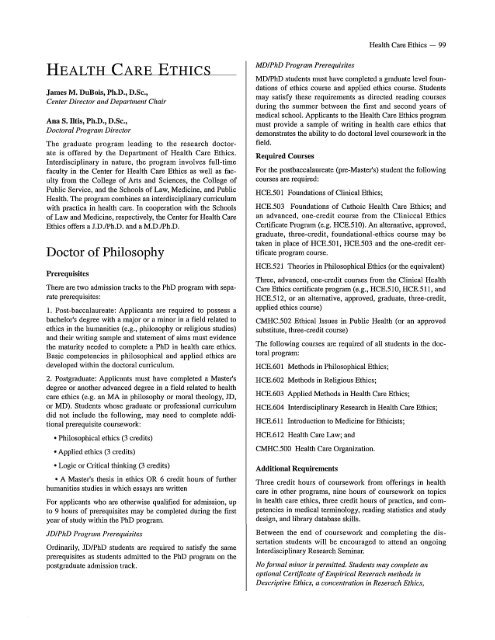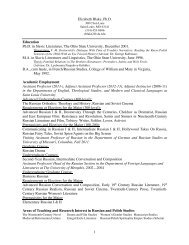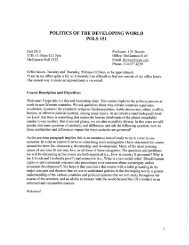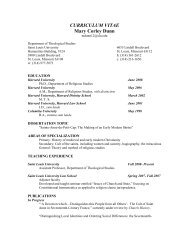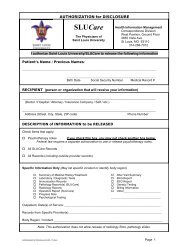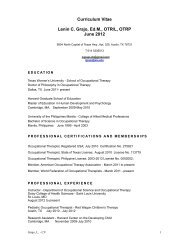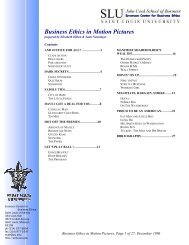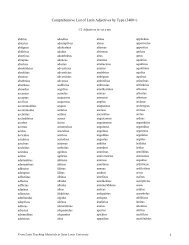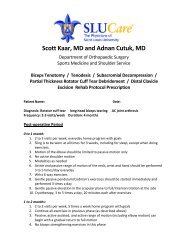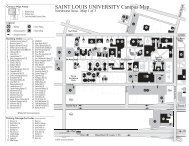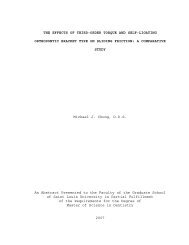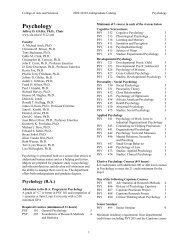Program Manual - Saint Louis University
Program Manual - Saint Louis University
Program Manual - Saint Louis University
You also want an ePaper? Increase the reach of your titles
YUMPU automatically turns print PDFs into web optimized ePapers that Google loves.
HEALTH CARE ETHICS<br />
James M. DuBois, Ph.D., D.Se.,<br />
Center Director and Department Chair<br />
Ana S. ntis, Ph.D., D.Se.,<br />
Doctoral <strong>Program</strong> Director<br />
The graduate program leading to the research doctorate<br />
is offered by the Department of Health Care Ethics.<br />
Interdisciplinary in nature, the program involves full-time<br />
faculty in the Center for Health Care Ethics as well as faculty<br />
from the College of Arts and Sciences, the College of<br />
Public Service, and the Schools of Law, Medicine, and Public<br />
Health. The program combines an interdisciplinary curriculum<br />
with practica in health care. In cooperation with the Schools<br />
of Law and Medicine, respectively, the Center for Health Care<br />
Ethics offers a lD.IPh.D. and a M.D.lPh.D.<br />
Doctor of Philosophy<br />
Prerequisites<br />
There are two admission tracks to the PhD program with separate<br />
prerequisites:<br />
1. Post-baccalaureate: Applicants are required to possess a<br />
bachelor's degree with a major or a minor in a field related to<br />
ethics in the humanities (e.g., philosophy or religious studies)<br />
and their writing sample and statement of aims must evidence<br />
the maturity needed to complete a PhD in health care ethics.<br />
Basic competencies in philosophical and applied ethics are<br />
developed within the doctoral curriculum.<br />
2. Postgraduate: Applicants must have completed a Master's<br />
degree or another advanced degree in a field related to health<br />
care ethics (e.g. an MA in philosophy or moral theology, ID,<br />
or MD). Students whose graduate or professional curriculum<br />
did not include the following, may need to complete additional<br />
prerequisite course work:<br />
• Philosophical ethics (3 credits)<br />
• Applied ethics (3 credits)<br />
• Logic or Critical thinking (3 credits)<br />
• A Master's thesis in ethics OR 6 credit hours of further<br />
humanities studies in which essays are written<br />
For applicants who are otherwise qualified for admission, up<br />
to 9 hours of prerequisites may be completed during the first<br />
year of study within the PhD program.<br />
JDIPhD <strong>Program</strong> Prerequisites<br />
Ordinarily, JD/PhD students are required to satisfy the same<br />
prerequisites as students admitted to the PhD program on the<br />
postgraduate admission track.<br />
MDIPhD <strong>Program</strong> Prerequisites<br />
Health Care Ethics - 99<br />
MDIPhD students must have completed a graduate level foundations<br />
of ethics course and applied ethics course. Students<br />
may satisfy these requirements as directed reading courses<br />
during the summer between the first and second years of<br />
medical school. Applicants to the Health Care Ethics program<br />
must provide a sample of writing in health care ethics that<br />
demonstrates the ability to do doctoral level coursework in the<br />
field.<br />
Required Courses<br />
For the postbaccalaureate (pre-Master's) student the following<br />
courses are required:<br />
HCE.501 Foundations of Clinical Ethics;<br />
HCE.S03 Foundations of Cathoic Health Care Ethics; and<br />
an advanced, one-credit course from the Cliniccal Ethics<br />
Certificate <strong>Program</strong> (e.g. HCE.SlO). An alternative, approved,<br />
graduate, three-credit, foundational-ethics course may be<br />
taken in place of HCE.SOI, HCE.503 and the one-credit certificate<br />
program course.<br />
HCE.521 Theories in Philosophical Ethics (or the equivalent)<br />
Three, advanced, one-credit courses from the Clinical Health<br />
Care Ethics certificate program (e.g., HCE.5lO, HCE.Sl1, and<br />
HCE.512, or an alternative, approved, graduate, three-credit,<br />
applied ethics course)<br />
CMHC.502 Ethical Issues in Public Health (or an approved<br />
substitute, three-credit course)<br />
The following courses are required of all students in the doctoral<br />
program:<br />
HCE.601 Methods in Philosophical Ethics;<br />
HCE.602 Methods in Religious Ethics;<br />
HCE.603 Applied Methods in Health Care Ethics;<br />
HCE.604 Interdisciplinary Research in Health Care Ethics;<br />
HCE.611 Introduction to Medicine for Ethicists;<br />
HCE.612 Health Care Law; and<br />
CMHC.SOO Health Care Organization.<br />
Additional Requirements<br />
Three credit hours of coursework from offerings in health<br />
care in other programs, nine hours of coursework on topics<br />
in health care ethics, three credit hours of practica, and competencies<br />
in medical terminology, reading statistics and study<br />
design, and library database skills.<br />
Between the end of coursework and completing the dissertation<br />
students will be encouraged to attend an ongoing<br />
Interdisciplinary Research Seminar.<br />
No Jormal millor is permitted. Students may complete an<br />
optional Certificate oj Empirical Reserach methods in<br />
Descriptive Ethics, a concentration in Reserach Ethics,


